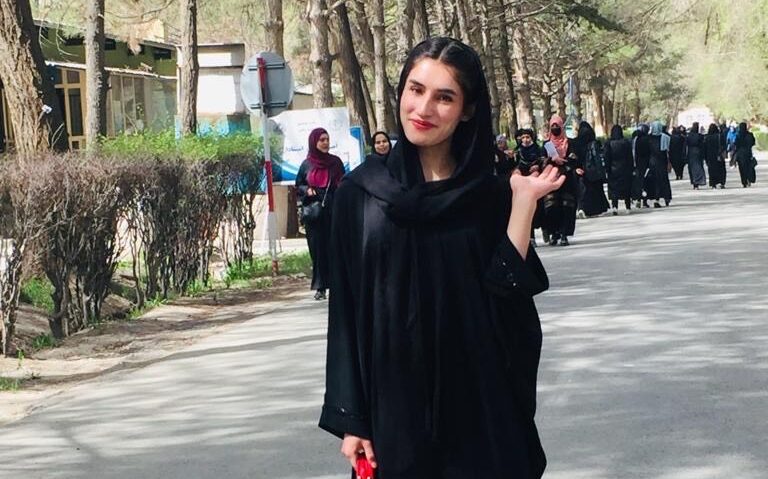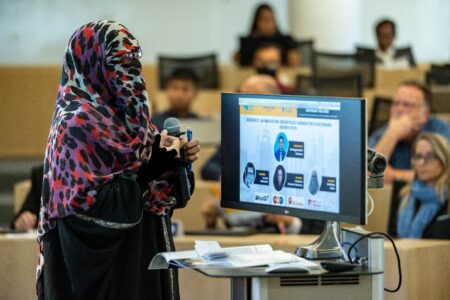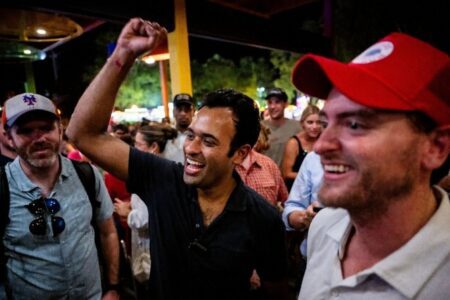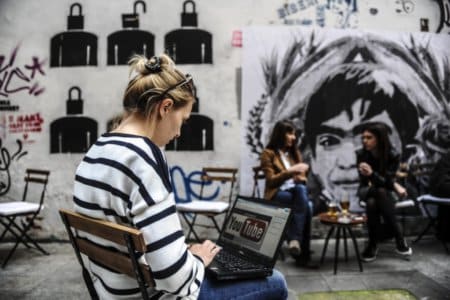
It’s difficult to live your life to the fullest when autocratic authorities govern your country.
“Afghanistan under the Taliban remains the most repressive country in the world regarding women’s rights,” Roza Otunbayeva, special representative of the United Nations’s secretary-general and head of the UN political mission in Afghanistan, said in a statement.
From 1996 until 2001, the Taliban ruled Afghanistan with an iron fist. Women and girls, in particular, were discriminated against under the Taliban’s version of Islamic Sharia law.
They were banned from going to school, working, leaving the house without a male chaperone, showing their skin in public, and much more.
Still, there was a brief period of respite between the end of 2001 and August 2021, when the Taliban were ousted from power. Girls could return to school, and women could work once more.
It was during those years when Aziza Akrami completed her bachelor’s degree in management information systems at Kabul University.

Akrami obtained her bachelor’s degree in management information systems at Kabul University before the Taliban returned to Afghanistan in 2021. Source: Aziza Akrami
Life before and during restrictions
At that time, Akrami had also completed courses in finance and banking, allowing her to secure a role as a country human resource officer at Bank Alfalah, one of the largest private banks in Pakistan. Upon graduating, Akrami held roles at the Norwegian Church Aid, a Norwegian humanitarian and ecumenical organisation, and Aseel, a tech-driven solutions provider committed to uplifting underserved communities in Afghanistan and Turkey.
She also worked with Canadian Women for Women in Afghanistan as a grants and scholarship coordinator, helping women obtain funds for their education or get scholarships for courses.
But in the blink of an eye, everything changed — the Taliban returned, and with them, their stringent rules.
It was then that it became clear to Akrami that she needed to set her sights on greener pastures. She wanted to pursue her master’s degree, and obtaining it in Afghanistan wasn’t her choice, not that she had it in the first place.
“I wasn’t very happy with the educational system we have in Afghanistan because it’s very basic,” says Akrami. “I wanted to learn something more in-depth, more applicable to real life, and with a better system.”
However, that wasn’t the only reason she decided to take off.
“Being in Afghanistan is very difficult. You can barely find a job, and you can barely get an opportunity. For women, even getting out of the house is very difficult and risky. You have to dress up from the head to the toe and have someone with you. There were a lot of overwhelming restrictions that, at that point, no woman could take it. It’s like a prison.”
With that, it became a matter of securing a scholarship, a visa, and the rest of her life.

For most, applying to university is a mildly stressful event; for Akrami, it was a rollercoaster ride. Source: Aziza Akrami
An uphill battle to fulfill her dreams
Akrami’s first offer came from the US. It was a master’s programme from the University of Maine focusing on sustainability and technology – exactly what she was looking for.
But luck wasn’t on her side.
The cost of a master’s degree in the US ranges between US$56,000 and US$75,000, depending on the school, the major, and the length of the programme. At a minimum, this would cost Akrami close to four million Afghan Afghani — something she could not afford.
So, she had to direct her attention elsewhere, a task that is more difficult than it sounds.
“Most educational institutions provide scholarships for Afghan women outside Afghanistan and not for those who are still in the country,” shares Akrami. “So, it’s extremely challenging to find a scholarship because the schools need a lot of funding to bring a woman from an ultra-risky country to their own country.”
Luckily for Akrami, she found her next offer quickly: a full scholarship for an International Master of Business Administration (MBA) at Porto Business School in Portugal.
Securing that scholarship was a big deal, but the hard part wasn’t nearly over.
Akrami had to get her visa before she made her way to Portugal. Doing this task would have been simple enough in any other country: you’d go to an embassy and go through the necessary steps before being presented with your visa. In a Taliban-controlled Afghanistan, things aren’t so easy.
Most of the embassies in Afghanistan have temporarily suspended their activities. These include popular study destinations, including the UK, the US, Canada, Germany, and more.
In Akrami’s case, the Portuguese don’t have a single embassy or consulate in Afghanistan.
This meant that to begin the process of getting her visa, Akrami had to leave her country. And as women weren’t allowed anywhere without a familial male accompanying them, Akrami had to seek help from her older brother so she could get her visa sorted out in neighbouring Iran.
“It was difficult for him too because he had to make a deal with his office to take two weeks off,” says Akrami.
That wasn’t all — once she had her visa ready, she could not stop back in Afghanistan; Akrami would be headed straight to Portugal with no clear plans of when she’d return home.
As much as leaving meant paving the path for a hopefully better and brighter future, Akrami recalls the night she left to be a bittersweet memory.
“My mom was crying; she was very upset that I was leaving and my father was upset too. He was saying things like, ‘You shouldn’t have to go. You’re very young. How are you going to figure out everything?’”
“It was very difficult. Everyone was saying goodbye to me. And I had to say goodbye to my two cats hidden in my family’s bags. It was too much. It was difficult to say goodbye to everything.”
In Iran, it took a little over two weeks for Akrami’s visa application to be approved. With that in hand, she was on the next flight to Portugal.

Akrami is pursuing her MBA at Porto Business School, ranked #53 in the Financial Times European Business Schools Ranking 2023. Source: Aziza Akrami
From Afghanistan refugee to MBA candidate overnight
Akrami arrived in Portugal at night. Once she reached her residency, she was out like a light.
In most cases, students — MBA students included — have a week of orientation to get to know the school, their programme, and their classmates. After that, students begin to dive into their studies. For an MBA, especially a one-year programme, classes are jam-packed with information, assessments, and group projects from the get-go.
Between getting her scholarship and visa sorted, Akrami joined her programme two months later than most.
Trying to sit in for classes online wasn’t easy either. “I was constantly getting blocked because of the system of the school, and Iran had a lot of restrictions with the internet,” says Akrami. “I had to keep going to the embassy, and the classes were in the morning, but I had to get my visa done during that time. I managed to finish one course online, but I missed out on a lot of others.”
As tempting as it was to take a day off to settle herself into this entirely new life and environment, Akrami’s housemate, a fellow Afghanistan refugee who happened to have arrived two weeks prior and was in the same programme as she was, got her out of the residency to start her day.
“She told me, “You need to go to class; you’ve already missed out on many things.’ So I dressed up and went to school with her.”
On her first day of classes, Akrami had to sit out of a pre-assigned group presentation that she couldn’t work on with her groupmates. Later on, she found out that she had a finance exam happening next week, one that she wouldn’t be able to take the assessment at a later date, so she had to start cramming as soon as possible.
“I have a one week, and all week we have a class from 8:30 a.m. to 1:30 p.m., and I also have to do group projects, study for the exam, and learn how this online system of the school works. It was overwhelming; it was intense.”
“A full-time MBA programme is super demanding; it’s challenging,” says Akrami. “I didn’t have enough time to settle. I started everything from zero.”

Akrami’s journey hasn’t been a smooth one, but she’s determined to make it work. Source: Aziza Akrami
Settling into a new life in Portugal and preparing for the future
While the journey hasn’t been easy, it definitely has been worth it.
“More or less of what I learned from my MBA is how you can adapt to a new country and culture, as well as how you gain new perspectives,” says Akrami. “It’s shifted my mindset, and I now have a broader perspective of how things work from different angles and how we can bring something from nothing and build that into a project or business.”
“There was a lot of doubt about whether I should do this because it was so difficult in the beginning, but now that I’m at the end of the programme, I see that it’s completely worth it. I feel much more prepared for what will come in the future.”
Now, she’s putting her hard-earned knowledge into good use.

Akrami’s work with Blossom Hill Foundation helps mothers and children in vulnerable Afghan communities access health services and health education. Source: Aziza Akrami
Akrami’s work with Blossom Hill Foundation, a non-profit organisation investing in education programmes for peace, is a sure step to fulfilling her goals of helping other refugees. As a project lead, Akrami and her sister launched the Healthy Children Programme, offering essential health services and health education to mothers and children in vulnerable Afghan communities.
There are even plans for an upcoming collaboration with senior and medical students from the University of Pennsylvania, something that Akrami is excited about.
It’s a positive step in the right direction, and Akrami is confident that others can do it too.
“You have to put in lots of hard work. I know it’s difficult and uncomfortable – change is always uncomfortable. But I believe if you look into the opportunities, have faith, and are consistent in putting in the work, you can get it. There’s nothing in the world you cannot do.”
With graduation approaching, Akrami is ready to face a new chapter in her life, one step at a time.
“There are a lot of uncertainties for my future, like where to go after I’m done with my studies and if I should stay in Portugal. I’m really passionate about sustainability and technology, so I’ll be looking for opportunities to get into that sector,” she says.
“But my short-term goal right now is to get a job and learn Portuguese while I’m at it. I also want to get my driving licence because I didn’t have a chance to get it in Afghanistan, so yeah, that’s what I plan to do for now.”










